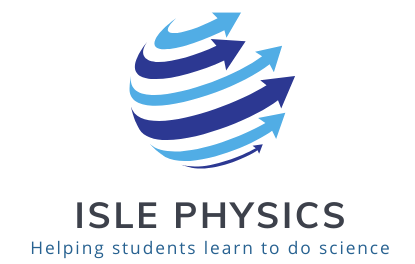Skip to content
Adopting the ISLE approach
- Join Facebook group “Exploring and Applying Physics to become a member of the community. The group offers monthly meetings.
- Read materials on this website and watch the talks (here, here, and here)about the ISLE approach. Listen to a podcast about the ISLE approach http://physicsalive.com/ISLE/.
- Take a workshop at the AAPT meeting or offered for the members of the Facebook group.
- Email Eugenia Etkina to schedule a meeting to get started.
- Educate yourself about the ISLE approach. There are several papers and a book about the ISLE approach. Make sure that you also learn about scientific abilities and rubrics. See the list of publications. The ISLE book (Etkina, E., Brookes D.T., & Planinsic, G. (2019) Investigative Science Learning Environment: When learning physics mirrors doing physics, Institute of Physics, Concise Publishing; Morgan and Claypool Publishers, DOI 10.1088/2053-2571/ab3ebd.) will answer most of your questions.
- Contact your Pearson representative to obtain a free copy of the textbook “College Physics” Explore and Apply” by Etkina, Planinsic and Van Heuvelen. Start reading the textbook as if you have never studied physics. If you are teaching high school, you need an AP edition of the textbook. If you have trouble navigating access to the textbook and supporting materials, please email Eugenia Etkina at eugenia.etkina@gse.rutgers.edu
- Ask your Pearson representative (or email Eugenia) to provide you with access to Mastering Physics. There you will find the Instructor Guide (IG), the Active Leaning Guide (ALG) and the on-line Active Learning Guide (OALG – a version of the ALG for teaching online, created during the COVID pandemic).
- After taking the workshop, reading papers and the book about ISLE, read Chapter 1 of the IG and think of what changes you need to make to the course to ISLEize it. Discuss your plans with a developer who matches your course situation best. There are many decisions that you need to make, among those the most important are: what are the goals of the course? how will the students do the observational, testing and application experiments? when and how will the students engage in group work? how will they be assessed? what mechanisms for improvements in their work will be available for them?
- Start slow. Remember, you do not need to make any new materials, you need to incorporate the materials that we have created into your course structure and decide how much help your students need.
- In our experience, students’ potential is unlimited. With proper support and opportunities to revise and improve their work without punishment, your students will be extremely successful learning physics through the ISLE approach.

